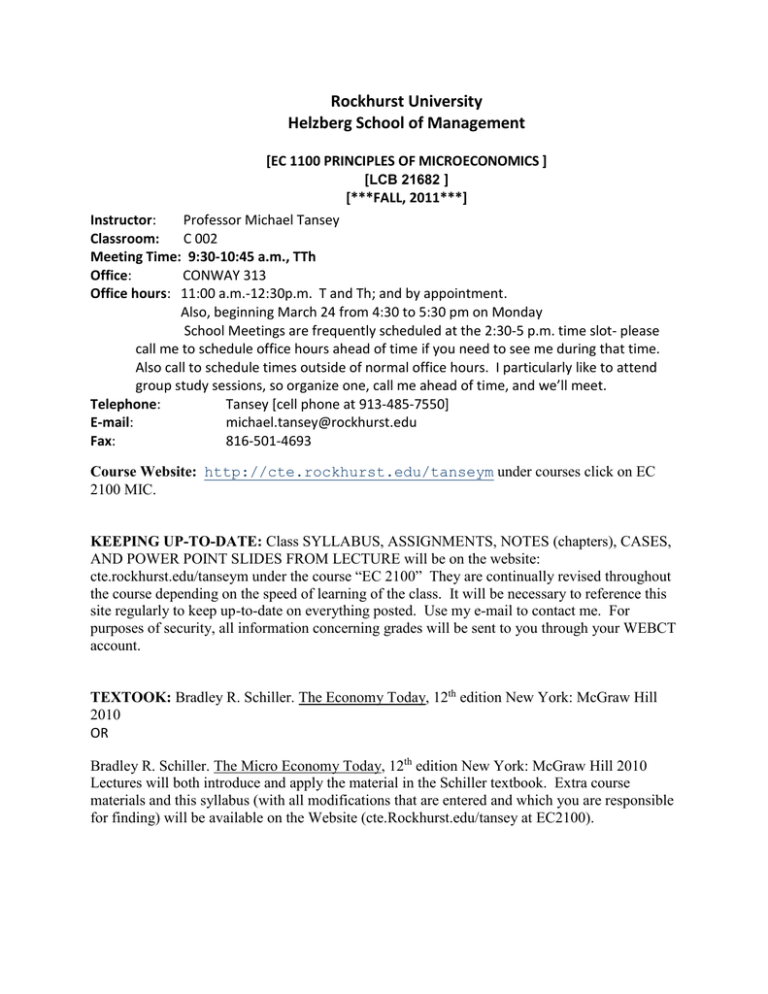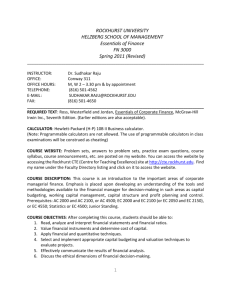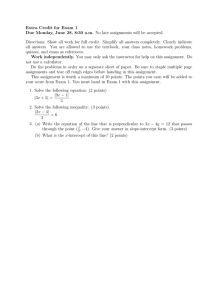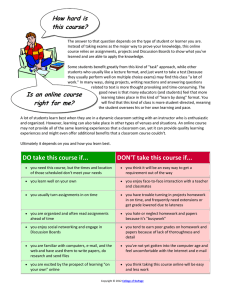Rockhurst University Helzberg School of Management
advertisement

Rockhurst University Helzberg School of Management [EC 1100 PRINCIPLES OF MICROECONOMICS ] [LCB 21682 ] [***FALL, 2011***] Instructor: Professor Michael Tansey Classroom: C 002 Meeting Time: 9:30-10:45 a.m., TTh Office: CONWAY 313 Office hours: 11:00 a.m.-12:30p.m. T and Th; and by appointment. Also, beginning March 24 from 4:30 to 5:30 pm on Monday School Meetings are frequently scheduled at the 2:30-5 p.m. time slot- please call me to schedule office hours ahead of time if you need to see me during that time. Also call to schedule times outside of normal office hours. I particularly like to attend group study sessions, so organize one, call me ahead of time, and we’ll meet. Telephone: Tansey [cell phone at 913-485-7550] E-mail: michael.tansey@rockhurst.edu Fax: 816-501-4693 Course Website: http://cte.rockhurst.edu/tanseym under courses click on EC 2100 MIC. KEEPING UP-TO-DATE: Class SYLLABUS, ASSIGNMENTS, NOTES (chapters), CASES, AND POWER POINT SLIDES FROM LECTURE will be on the website: cte.rockhurst.edu/tanseym under the course “EC 2100” They are continually revised throughout the course depending on the speed of learning of the class. It will be necessary to reference this site regularly to keep up-to-date on everything posted. Use my e-mail to contact me. For purposes of security, all information concerning grades will be sent to you through your WEBCT account. TEXTOOK: Bradley R. Schiller. The Economy Today, 12th edition New York: McGraw Hill 2010 OR Bradley R. Schiller. The Micro Economy Today, 12th edition New York: McGraw Hill 2010 Lectures will both introduce and apply the material in the Schiller textbook. Extra course materials and this syllabus (with all modifications that are entered and which you are responsible for finding) will be available on the Website (cte.Rockhurst.edu/tansey at EC2100). Learning Objectives EC 1100 Principles of Microeconomics—A first course in microeconomics, a social science, that introduces students to theories of how consumers and producers interact through supply and demand within the economy. This course helps students in developing a scientific approach to studying economic systems such as modern capitalism. Students investigate the structure of market behavior, performance in the marketplace and optimizing behavior regarding consumer demand, revenues, costs, and profits. BSBA Program EC After completing the course, students should be able to: Learning Goal[s] L.O. # 1 Demonstrate written communication skills by articulating and supporting ideas using appropriate economic terminology 2 Develop the capability for studying and turning in assignments PAPERLESSLY. Evaluate the role and effectiveness of government in the economy 3 4 Articulate differing value systems and their relevance to different economic paradigms. 5 Acquire the habit of reading quality media often and critically 6 Use EXCEL to analyze data 7 Collect and analyze data on markets and industries. 8 Analyze price and output decisions for the eight market types using competitive analysis and an understanding of vertical relationships among markets. Effectively grasp appropriate economic methodology. 13 3 14 Use elementary microeconomic theory and models to understand buyer and seller behavior in both the product and resource market. 5 15 Evaluate the impact of macro and government policy on the firm. 3 16 Apply microeconomic theory and models to current events. 3 17 Consider and discuss social justice issues, and how they relate to the firm. 2 18 Analyze various industry structures and evaluate their effects. 3 Course Requirements and Grading: Think of the teacher as a coach. Think of yourself as being on a team. In order to win you must learn what you don't know. Once you can tell the coach what you don't know, he can help you learn the few tricks he knows. For the rest, you must be resourceful, creative, and willing to share with others what you have learned. In class we will share and learn together. For these reasons, grades are based on the following: 1) 2) Class Discussion and Exercises (15%+): You are expected to be current in and to discuss major issues that are presented in the media and to explicate economic concepts based on the chapters assigned for the week or in previous weeks. Oral quizzes over the chapter material will frequently be made in class. Such oral quizzes often be voluntary and will be awarded with points. Particularly good insights and use of economic concepts introduced in discussion may also be awarded with points. The best preparation for these oral quizzes and discussion is to read the textbook chapters that are assigned and to keep current with the media. Also we will frequently have in-class exercises. These will often be graded for extra credit. To receive an “A”: in the class you need to make points through other sources besides tests and homework assignments. HOMEWORK (45%): Regular homework exercises will be assigned (check cte.rockhurst.edu/tanseym at EC2000). Your average grade on these assignments will be weighted as 45% of the course grade (400 points maximum). Each assignment is graded on a percentage basis. IN ORDER TO PROMOTE FAIRNESS TO ALL OF THE STUDENTS IN THE CLASS WHO DO NOT HAVE ACCESS TO HOMEWORKS OF PREVIOUS STUDENTS, ALL ARTICLES THAT YOU USE FOR ASSIGNMENTS MUST HAVE APPEARED IN THE MEDIA AFTER THE FIRST DAY OF CLASS DURING THIS SEMESTER 3) Summary EXAMS (40%): There are three exams. The first two are worth 10% of the grade each. The final is worth 20% of the grade. Your average grade on these exams will be weighted as 40% of the course grade (400 points maximum). Each assignment is graded on a percentage basis. Class Participa- Homework Exam I Exam II Final Exam Tion, Exercises Percentag e 15% (150 45% (450 10% (100 points 10%(100 points points points +) maximum) maximum) maximum) 20%(200 points maximum) GRADES: The following grades will be matched to point totals for students: A=90%+, B=80%+, C=70%+, D=60%+ & F is below 60%. "+" and "-" are used for borderline cases. These limits may be adjusted downward but will not be adjusted upward. In other words, you may be able to make a better grade for a given numerical score, but you will not make a worse grade. TURNING IN ASSIGNMENTS AND OTHER COMMUNICATIONS: The assignments must be sent by email to me at Michael.tansey@rockhurst.edu FOR THE PURPOSES OF DEVELOPING A PORTFOLIO TO WHICH YOU WILL HAVE ACCESS AT THE END OF THE COURSE, PLEASE SUBMIT YOUR ASSIGNMENTS AS FOLLOWS: Please name the subject line any e-mail with your included assignment or with any communications on the assignments as "Mic12sLastnameASSNi". Where "Lastname" should be replaced with your last name. Where "i" should be replaced with the number of the assignment that is being turned in. My e-mails are grouped by subject and without that name your email will not be found. Please also name the files you send as "Mic12sLastnameASSNi" If you are allowed to resubmit an assignment then label it as "Mic12sLastnameASSNiresubmitj" where “i” is the assignment and “j” indicates the number of resubmission. If you do not include “resubmit” at the end of your title and file name it will simply wipe out the previous assignment without being graded AND WILL APPEAR TO BE LATE BECAUSE OF THE LATER DATE ON THE RESUBMITTED FILE Always name BOTH the “subject” line of your e-mail AND the file with the same name. TO BE SAFE JUST LABEL EVERYTHING WITH “Mic12sLastnameASSNi” THAT WAY I CAN FIND IT – EVEN YEARS FROM NOW WHEN I AM WRITING RECOMMENDATIONS FOR YOU. Byassignments following these instructions carefully wille-mail be able to preserve files you sendtome All should be sent to me throughI the system . If youthe send a message meinata portfolio which will help me to write a recommendation for make you anytime the future. It my E-mail address (michael.tansey@rockhurst.edu) sure the in SUBJECT LINE will also allow you in the future to request copies from me of what you have done in the of the e-mail bears the title “Mic12SlastnameWhateversubject” with whatever subject after your class. “lastname”. Otherwise, I can’t be responsible for finding the message. You will need TO send your assignments using Microsoft Office (2003 OR 2007)- generally in Microsoft’s EXCEL or WORD (see appendix I below). Policies Make-up exams. Since exams are cumulative, missing an exam will be made up by taking the average percentage of the quiz grades (weighted appropriately according to the material) applied to the maximum possible point total on the exam. If the final is missed, an average percentage based on the quizzes and two previous exams (weighted appropriately according to the material) will be applied to the maximum point total on the final exam. In other words, once you have shown you can do the material, I try to give you the benefit of the doubt. Setting the system up this way provides a reward to people who learn the material and do well early. ON-Time Assignments. DUE BY THE BEGINNING OF CLASS: NO EXCEPTIONS (HOMEWORK CAN BE TURNED IN EARLIER: up to 50% OFF IF LATER). The deadlines for some assignments may be extended beyond what is shown in the syllabus. But such extensions will be announced before the deadline shown in this syllabus and can be done only with permission of the professor. In-class questions and quizzes may not be made up, providing an incentive for regular attendance. Individual Effort. Exams, finals, homework, questions and quizzes will not be team efforts; they must be done alone. Attendance: It is required that students attend classes regularly and be on time for the class. However, if a student expects to miss class, the permission of the instructor is required in advance to receive an excused absence, and the instructor may ask for additional work to be performed to make up the class. The instructor will lower one grade for each unexcused absence above 4 absences. Unless a student drops out, Six unexcused absences or more will result in an “F” for the course. Students are responsible for keeping track of their attendance. ADA Statement RU official policy: “Rockhurst University is committed to providing reasonable accommodations for students with disabilities. Please contact Sandy Waddell, Director, Access Office (Massman Hall Room 7, (816) 501-4689, sandy.waddell@rockhurst.edu) to provide documentation and request accommodations. If accommodations have already been approved by the Access Office, please communicate with the instructor of this course regarding these arrangements by the second week of class in order to coordinate receipt of services.” Student Contact Information: RU official policy: “Student contact information must be kept current in order to receive important notices from Rockhurst University. Your contact information is online via your RockWeb account. Please check your local address, local phone number, and emergency contact information on RockWeb and revise as needed. All important University notices will be sent only to your RU email address. Please check your RU email account in addition to any other email accounts you may have. Accounts are activated at the Computer Services Help Desk (Conway 413).” Academic Honesty Policy: Plagiarism and cheating will not be tolerated. The Rockhurst University Catalog provides examples of academic dishonesty and outlines the procedures, penalties, and due process accorded students involved in academic dishonesty. All infractions will be immediately referred to the Dean's office. In your research paper, make sure you provide citations for all ideas and information that are not your own. In your homework, make sure you provide citations for all ideas and information that are not your own. Data from the internet must include the complete URL from which the data came so that I can verify the data. In addition the date and time at which you collected the data must be submitted. Crisis Management The Crisis Management Team for Rockhurst University, out of a concern for the safety and welfare of all community members, urges you to familiarize yourself with Campus Emergency Procedures as well as emergency, evacuation, and shelter signage located within and outside of buildings across campus. They also request that you sign up for Rock@lerts, the University’s emergency communications system. All community members must comply with University staff instructions during regularly scheduled fire/tornado drills as well as actual emergencies. Information regarding the above resources can be found at www.rockhurst.edu/emergency. Copies of The Wall Street Journal will be available in the lobbies of Conway and Massman Hall. You will be receiving information about your online subscription to WSJ via your Rockhurst email account. Please check your email for the registration information from WSJ/Dow Jones. Please check to make sure your main mailing address in RockWeb is correct. Your Business Week will be sent to that address. Changes to your address can be made by going to: http://www.businessweek.com/service.htm. You can also contact our Education Support Team at bwkedusupport@cdsfulfillment.com or 1-800-843-7352. Topical Outline DATE SUBJECT Jan 19 Demand and Supply Th Jan 24-6 Equilibrium, Shortages, Surpluses, Elasticities Martket Failure and Government Failure Jan 31 T-Feb 2 Th Marginalism Feb7 Tu-9 Th Feb 14 production,Cost T-16 Th Feb 21 Production, Cost, Competition T-23 Th Extra Economy MicroEcon Reading power point on demand and supply Today 3 Today 3 Hw #1 examples and regulation handout Hw #2 Examples and chapter 1 and powerpoint lecture on market failure 1.marginalism and 20 (not 5 (not appendix) appendix) 4 4 CLASS EVENTS Bring WSJ. Hwk #1 due by beginning of class on Feb 2 21 6 22 7 balloon experiment 2. structure, conduct, 23 performance and competition 8 Quiz (preparation for the exam Handout, andPowerpointt, Production and cost. and ppt slides Feb 28 Monopoly T-Mar 1 Th Mar 3- spring break!!!!! be careful 11 Mar 13 Oligopoly T-Mar 15 Th Mar 20 Monopolistic Competition T-Mar 22 Th Mar 27 Porter Model. Vertical Market T-Mar power 29 3. Monopoly, oligopoly, etc 24 9 . 25 10 26 11 Vertical Markets class handout 30 15 Ap 3 TAp 5 Th Summary of market structure 29 14 Quiz: preparation for exam Chp 17 4 ,27, 28 4, 12, 13 EXAM II. Example Hwk #3 Examples 31 16 Hwk #3 by beginning of class on Ap 19 20-21 Vertical example for test . With graphs and answers and Final Exam Answers Labor Markets: Getting a job, Unions Ap 10 Market Failure revisited T-Ap 12 Th Ap 17 T-Ap 19 financial markets Th Ap 24 T- International Trade International Class handout (bring to 35-36 Ap 26 Th Finance class) May 1 T Review example of Final Exam. May 3 Th FINAL EXAM: Th. 10:30-12:30 EXAM #1. (Mar 1) Example Hwk #2 Due by beginning of class on March 22



